心理健康英文版
- 格式:pptx
- 大小:3.09 MB
- 文档页数:14
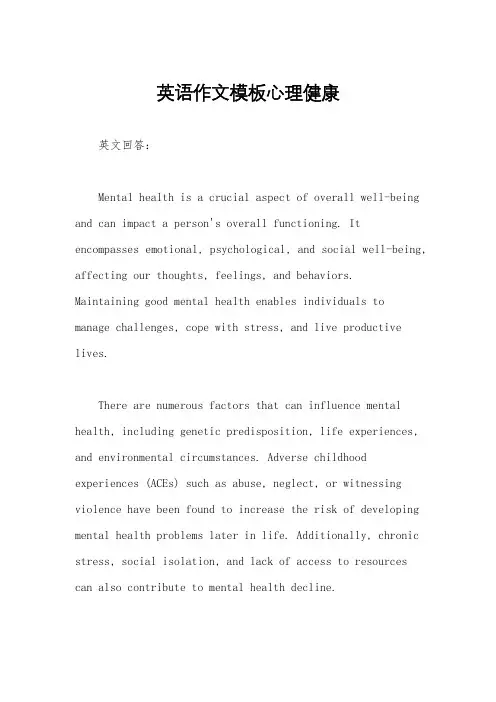
英语作文模板心理健康英文回答:Mental health is a crucial aspect of overall well-being and can impact a person's overall functioning. It encompasses emotional, psychological, and social well-being, affecting our thoughts, feelings, and behaviors.Maintaining good mental health enables individuals to manage challenges, cope with stress, and live productive lives.There are numerous factors that can influence mental health, including genetic predisposition, life experiences, and environmental circumstances. Adverse childhood experiences (ACEs) such as abuse, neglect, or witnessing violence have been found to increase the risk of developing mental health problems later in life. Additionally, chronic stress, social isolation, and lack of access to resources can also contribute to mental health decline.Mental health disorders are common and can manifest in various forms. Some of the most prevalent conditionsinclude depression, anxiety disorders, bipolar disorder,and personality disorders. Symptoms can range from mild to severe and can include sadness, anxiety, irritability, difficulty sleeping, changes in appetite, and impaired cognitive function.Early recognition and intervention are essential for positive mental health outcomes. Seeking professional help from mental health providers such as therapists, psychiatrists, or counselors can be instrumental in addressing mental health concerns. Therapy can provide individuals with a safe and supportive environment to explore their emotions, develop coping mechanisms, andlearn new ways of thinking and behaving. Medication mayalso be prescribed in cases where symptoms are severe or persistent.In addition to professional interventions, there are several self-care strategies that can promote mental health. These include:Exercise: Regular physical activity releases endorphins that have mood-boosting effects.Healthy Diet: Eating a balanced diet with plenty of fruits, vegetables, and whole grains can provide essential nutrients for optimal brain function.Sleep: Getting sufficient sleep is essential for emotional regulation and cognitive functioning.Mindfulness: Practicing mindfulness exercises such as meditation or deep breathing can help reduce stress and promote emotional well-being.Social Connections: Building and maintaining strong relationships with others provides emotional support and a sense of belonging.Mental health is a fundamental aspect of overall health and well-being. By understanding the factors that influence mental health, recognizing symptoms of mental healthdisorders, and engaging in self-care practices, we can promote positive mental health outcomes and live fulfilling lives.中文回答:心理健康是整体健康的一个重要方面,它会影响一个人的整体功能。
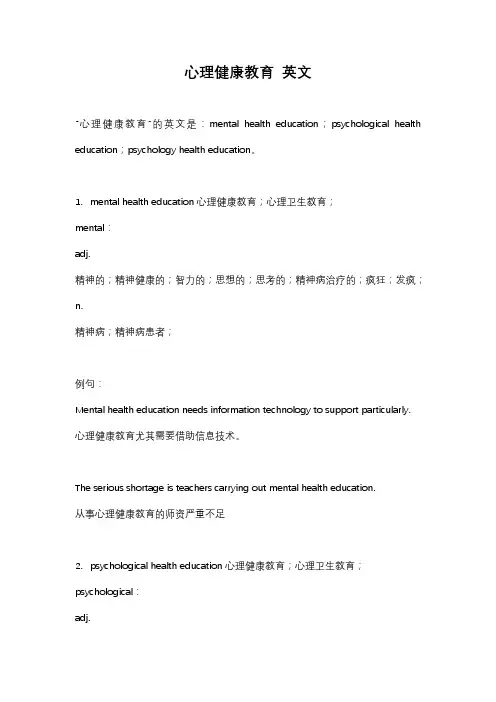
心理健康教育 英文“心理健康教育”的英文是:mental health education;psychological health education;psychology health education。
1.mental health education心理健康教育;心理卫生教育;mental:adj.精神的;精神健康的;智力的;思想的;思考的;精神病治疗的;疯狂;发疯;n.精神病;精神病患者;例句:Mental health education needs information technology to support particularly.心理健康教育尤其需要借助信息技术。
The serious shortage is teachers carrying out mental health education.从事心理健康教育的师资严重不足2.psychological health education心理健康教育;心理卫生教育;psychological:adj.心理的;心理学的;心灵的;精神上的;关于心理学的例句:Psychological health education is a higher professional and comprehensive educ ation activities.心理健康教育是一项专业性要求较高的综合性的教育活动。
The basis for creativity education is psychological health education.高校创造性教育的基础是心理健康教育。
3.psychology health education心理健康教育psychology:n.心理;心理学;心理特征;心理影响例句:The psychology health education should be put together with work of the diseas e prevention.开展心理健康教育要与卫生防病工作结合起来。
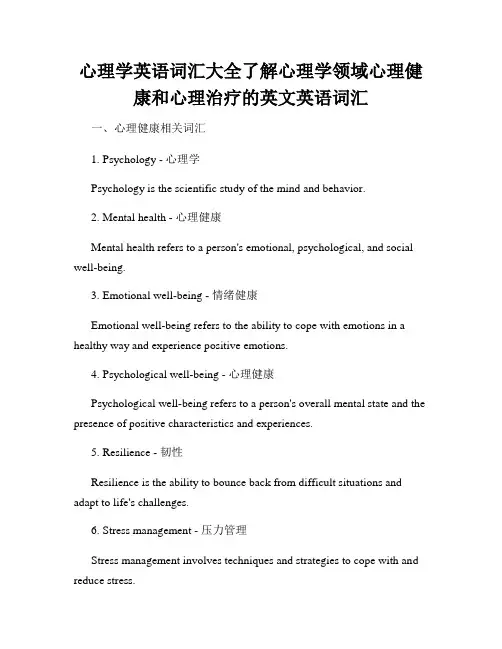
心理学英语词汇大全了解心理学领域心理健康和心理治疗的英文英语词汇一、心理健康相关词汇1. Psychology - 心理学Psychology is the scientific study of the mind and behavior.2. Mental health - 心理健康Mental health refers to a person's emotional, psychological, and social well-being.3. Emotional well-being - 情绪健康Emotional well-being refers to the ability to cope with emotions in a healthy way and experience positive emotions.4. Psychological well-being - 心理健康Psychological well-being refers to a person's overall mental state and the presence of positive characteristics and experiences.5. Resilience - 韧性Resilience is the ability to bounce back from difficult situations and adapt to life's challenges.6. Stress management - 压力管理Stress management involves techniques and strategies to cope with and reduce stress.7. Self-care - 自我照顾Self-care refers to activities and practices that individuals engage in to take care of their physical, mental, and emotional health.8. Mindfulness - 正念Mindfulness is a state of being fully present and engaged in the current moment, without judgment.9. Meditation - 冥想Meditation is a practice that involves focusing one's mind and achieving a calm and relaxed state.10. Self-esteem - 自尊心Self-esteem refers to an individual's overall evaluation of their self-worth and personal value.二、心理治疗相关词汇1. Therapy - 治疗Therapy refers to the treatment of psychological or emotional problems through various techniques and approaches.2. Psychologist - 心理学家A psychologist is a professional who studies and practices psychology and provides therapy to individuals.3. Psychotherapy - 精神疗法Psychotherapy is a form of therapy that focuses on helping individuals overcome mental and emotional challenges and improve their well-being.4. Counseling - 咨询Counseling involves providing guidance and support to individuals or groups to help them explore and address their personal and emotional issues.5. Cognitive-behavioral therapy (CBT) - 认知行为疗法Cognitive-behavioral therapy is a type of therapy that focuses on identifying and changing negative thought patterns and behaviors.6. Psychodynamic therapy - 心理动力疗法Psychodynamic therapy aims to explore and address the unconscious processes and unresolved conflicts that contribute to psychological issues.7. Group therapy - 团体疗法Group therapy involves a therapist leading a group of individuals who share similar challenges and providing support and guidance.8. Family therapy - 家庭疗法Family therapy focuses on improving communication and resolving conflicts within a family system.9. Supportive therapy - 支持疗法Supportive therapy aims to provide emotional support and encouragement to individuals facing difficult circumstances.10. Intervention - 干预Intervention refers to a planned and structured approach to help individuals with addictive behaviors or other destructive patterns.总结:以上是心理学中与心理健康和心理治疗相关的常见英语词汇。
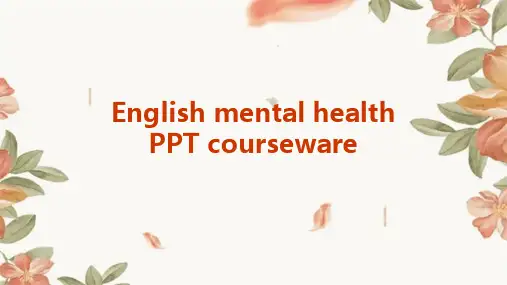
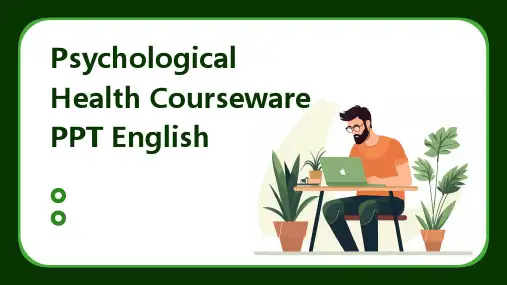
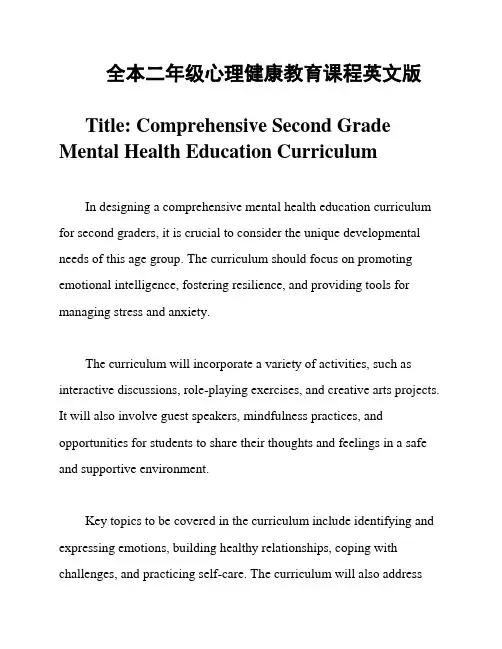
全本二年级心理健康教育课程英文版Title: Comprehensive Second Grade Mental Health Education Curriculum In designing a comprehensive mental health education curriculum for second graders, it is crucial to consider the unique developmental needs of this age group. The curriculum should focus on promoting emotional intelligence, fostering resilience, and providing tools for managing stress and anxiety.The curriculum will incorporate a variety of activities, such as interactive discussions, role-playing exercises, and creative arts projects. It will also involve guest speakers, mindfulness practices, and opportunities for students to share their thoughts and feelings in a safe and supportive environment.Key topics to be covered in the curriculum include identifying and expressing emotions, building healthy relationships, coping with challenges, and practicing self-care. The curriculum will also addresscommon mental health issues that may arise in childhood, such as bullying, peer pressure, and family changes.By implementing this mental health education curriculum, we aim to equip second graders with the knowledge and skills they need to navigate the complexities of their emotional well-being. Through a holistic approach that integrates social, emotional, and cognitive learning, we hope to foster a culture of mental wellness in our school community.Overall, this curriculum will serve as a foundation for promoting mental health awareness, reducing stigma, and empowering students to take control of their mental well-being. It is our belief that investing in early mental health education will have a lasting impact on the overall health and happiness of our students.。

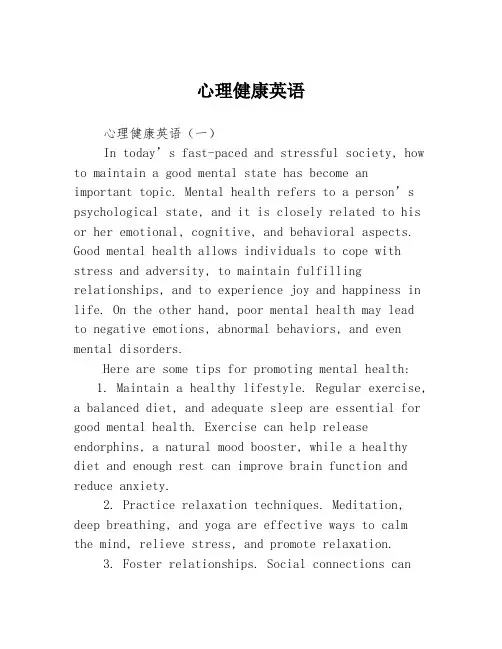
心理健康英语心理健康英语(一)In today’s fast-paced and stressful society, how to maintain a good mental state has become an important topic. Mental health refers to a person’s psychological state, and it is closely related to his or her emotional, cognitive, and behavioral aspects. Good mental health allows individuals to cope with stress and adversity, to maintain fulfilling relationships, and to experience joy and happiness in life. On the other hand, poor mental health may lead to negative emotions, abnormal behaviors, and even mental disorders.Here are some tips for promoting mental health:1. Maintain a healthy lifestyle. Regular exercise,a balanced diet, and adequate sleep are essential for good mental health. Exercise can help release endorphins, a natural mood booster, while a healthy diet and enough rest can improve brain function and reduce anxiety.2. Practice relaxation techniques. Meditation, deep breathing, and yoga are effective ways to calm the mind, relieve stress, and promote relaxation.3. Foster relationships. Social connections canprovide emotional support, reduce loneliness and isolation, and increase happiness. Make time forfamily and friends, join social groups, and engage in meaningful conversations.4. Pursue hobbies and interests. Hobbies and interests can provide a sense of accomplishment and pleasure, and they also offer an opportunity to learn and grow. Participate in activities that you enjoy and that give you a sense of purpose.5. Seek professional help when needed. If you are experiencing persistent negative emotions, abnormal behaviors, or other symptoms of mental distress, seek help from a mental health professional. They can provide diagnosis, treatment, and support.In conclusion, mental health is an integral part of overall health, and it requires daily attention and care. By adopting healthy habits, cultivating social connections, pursuing interests, and seeking help when necessary, we can promote mental well-being and enjoy a happy and fulfilling life.心理健康英语(二)As t he saying goes, “a sound mind in a sound body”. Therefore, taking care of mental health isjust as important as taking care of physical health. Stress is one of the main factors that threaten our mental health. It is a natural response to demanding situations, but if it becomes chronic, it can harm ourhealth and well-being. Here are some strategies to manage stress:1. Identify and manage stressors. Make a list of situations or people that trigger your stress, and try to avoid or minimize them. If that’s not possible,find ways to manage your stress response, such as taking deep breaths, counting to 10, or practicing relaxation techniques.2. Set priorities and realistic expectations. Identify what is important and what can wait, andfocus your energy on the most urgent tasks first. Also, set realistic and achievable goals, and don’t expect perfection from yourself or others.3. Build resilience. Resilience is the ability to bounce back from adversity and adapt to change. Youcan build resilience by cultivating a positive outlook, practicing gratitude, and learning from your mistakes.4. Practice self-care. Self-care is the practiceof taking care of your own physical, emotional, and mental needs. It includes activities such as exercise, healthy eating, getting enough sleep, and doing things you enjoy.5. Seek support. Don’t hesitate to ask for help when you need it. Talk to a friend, family member, or mental health professional. Join a support group or seek online resources.By managing stress effectively, we can improveour mental health and overall well-being. Remember,it’s okay to take a break, to say no, or to ask for help. Take care of yourself, and your mind and bodywill thank you for it.心理健康英语(三)Depression is a serious mental health disorderthat affects millions of people worldwide. It is characterized by persistent feelings of sadness, hopelessness, and loss of interest in activities that were once enjoyable. Depression can affect anyone regardless of age, gender, or background. Here are some strategies to cope with depression:1. Seek professional help. If you suspect thatyou may be suffering from depression, seek help from a mental health professional. They can provide diagnosis, treatment, and support. Treatments may include medication, psychotherapy, or a combination of both.2. Practice self-care. Depression can make it difficult to take care of yourself, but self-care is essential for recovery. Make sure to eat a healthy diet, exercise regularly, get enough sleep, and engage in activities that you enjoy.3. Talk to someone. Talking to a trusted friend, family member, or mental health professional can help you gain insight into your thoughts and feelings, and provide emotional support. Feeling understood andheard can help alleviate symptoms of depression.4. Build a support network. Join a support groupor community where you can connect with others whohave similar experiences. Having a support network can offer a sense of belonging, reduce loneliness, and increase social support.5. Challenge negative thoughts. Depression can cause negative thoughts and beliefs about yourself and the world around you. These thoughts can perpetuate feelings of sadness and hopelessness. Challenge these thoughts by asking yourself if they are based on facts, and if there is an alternative explanation.Depression can be a challenging and painful experience, but with the right treatment and support, recovery is possible. Remember, you are not alone, and it’s okay to ask for help. Take care of yourself, and reach out for support when you need it.。
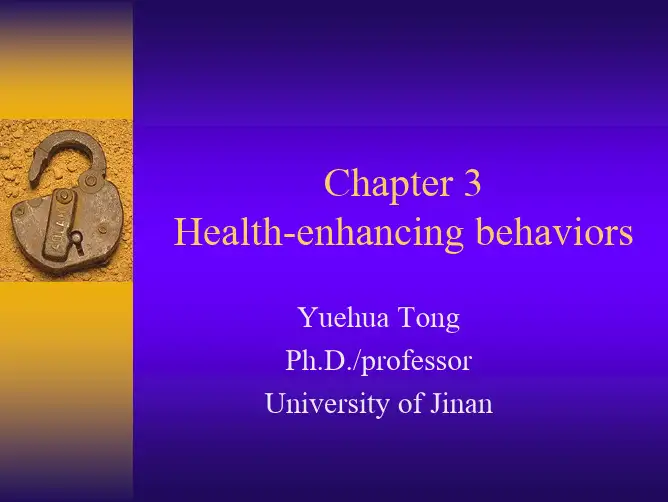
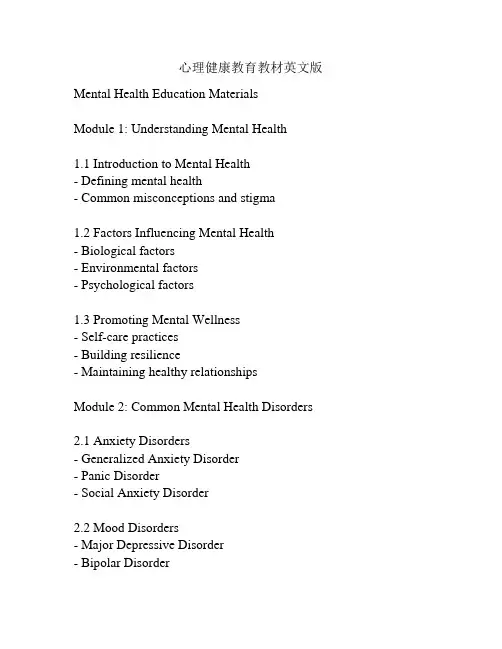
心理健康教育教材英文版Mental Health Education MaterialsModule 1: Understanding Mental Health1.1 Introduction to Mental Health- Defining mental health- Common misconceptions and stigma1.2 Factors Influencing Mental Health- Biological factors- Environmental factors- Psychological factors1.3 Promoting Mental Wellness- Self-care practices- Building resilience- Maintaining healthy relationshipsModule 2: Common Mental Health Disorders 2.1 Anxiety Disorders- Generalized Anxiety Disorder- Panic Disorder- Social Anxiety Disorder2.2 Mood Disorders- Major Depressive Disorder- Bipolar Disorder2.3 Eating Disorders- Anorexia Nervosa- Bulimia NervosaModule 3: Identifying Mental Health Symptoms 3.1 Recognizing Warning Signs- Changes in behavior- Intense mood swings- Withdrawal from social activities3.2 Seeking Professional Help- Importance of early intervention- Treatment options availableModule 4: Managing Mental Health4.1 Self-Care Strategies- Healthy lifestyle habits- Stress management techniques4.2 Support Systems- Building a support network- Seeking help from friends and family4.3 Therapeutic Approaches- Psychotherapy- Medication optionsModule 5: Promoting Mental Health in Schools5.1 Creating a Supportive Environment- Educating students about mental health- Reducing stigma5.2 Building Resiliency Skills- Implementing social-emotional learning programs- Encouraging self-expression through creativity5.3 Providing Mental Health Resources- School counseling services- Referral to community resourcesNote: The above content is a sample outline for a mental health education manual and does not contain any duplicate titles within the text. The actual content should be developed to suit the specific needs and target audience of the educational program.。

心理健康英语作文现象说明类英文回答:Mental health is a complex and multifaceted construct that encompasses various dimensions of psychological, emotional, and social well-being. It involves not only the absence of mental illness but also the presence of positive mental health, characterized by resilience, self-esteem, and a sense of purpose. Understanding the prevalence and risk factors associated with mental health issues iscrucial for developing effective prevention andintervention strategies.Research has consistently shown that mental health problems are prevalent worldwide, affecting individuals across all ages, socioeconomic backgrounds, and cultures. According to the World Health Organization (WHO), an estimated 1 in 4 people globally experience a mental health condition in a given year, with depression and anxiety being the most common disorders. Moreover, the COVID-19pandemic has further exacerbated the burden of mental illness, with increased rates of depression, anxiety, and stress reported globally.The onset and persistence of mental health problems can be influenced by a combination of factors, including genetic predispositions, biological factors, environmental stressors, and social determinants of health. Neurobiological research has identified imbalances in neurotransmitters, such as serotonin and dopamine, as potential contributors to depression and other mental health disorders. Genetic factors are also believed to play a role, as evidenced by increased susceptibility to mental illness among individuals with a family history of the condition.Environmental stressors, such as traumatic experiences, chronic stress, and adverse childhood experiences (ACEs), are known risk factors for mental health problems. Exposure to violence, abuse, neglect, and poverty can significantly increase the likelihood of developing mental health conditions, particularly in vulnerable populations such aschildren and adolescents. Moreover, social determinants of health, such as income inequality, lack of access to healthcare, and discrimination, can perpetuate mental health disparities and contribute to the development and maintenance of mental health problems.Mental health issues can have profound consequences for individuals, families, and societies as a whole. They can lead to impaired functioning in various domains of life, including social relationships, occupational performance, and overall well-being. Mental health problems can also contribute to increased healthcare utilization, absenteeism from work, and decreased productivity, resulting in significant economic costs. Moreover, mental health disorders are associated with an increased risk of chronic physical health conditions, such as cardiovascular disease, obesity, and diabetes, highlighting the bidirectional relationship between mental and physical health.中文回答:心理健康。
Embracing Mental Wellness: A Journey to Inner HarmonyIn today's fast-paced world, the importance of mental health and well-being cannot be overstated. It's not just about feeling good; it's about living a fulfilling and balanced life. Let's dive into the realm of mental wellness and explore the strategies and practices that can help us navigate the ups and downs of our emotional landscape.Understanding Mental HealthMental health is a crucial component of our overall well-being. It encompasses our emotional, psychological, and social well-being. Just as we prioritize our physical health by eating well and exercising, we must also take care of our mental health. It's about finding a sense of balance and inner peace amidst life's challenges.The Power of Self-CareSelf-care is not selfish; it's essential. Taking time for yourself, whether it's through meditation, exercise, or simply indulging in a hobby you love, is key to maintaining good mental health. By prioritizing self-care, you are investing in your well-being and resilience.Breaking the StigmaOne of the biggest barriers to seeking help for mental health issues is the stigma surrounding it. It's important to remember that it's okay not to be okay sometimes. Seeking support from a therapist, counselor, or support group is a sign of strength, not weakness. By breaking the stigma, we create a more supportive and understanding environment for everyone.Mindfulness and MeditationMindfulness and meditation are powerful tools for enhancing mental wellness. By being present in the moment and practicing mindfulness, we can reduce stress and anxiety. Meditation helps us quiet the noise in our minds and cultivate a sense of inner peace. Even just a few minutes of meditation a day can make a significant difference in our mental well-being.The Impact of RelationshipsOur relationships play a significant role in our mental health. Surrounding ourselveswith positive and supportive people can uplift our spirits and provide a sense of belonging. On the other hand, toxic relationships can drain our energy and negatively impact our mental well-being. It's essential to cultivate healthy and meaningful connections in our lives.Finding Joy in the Little ThingsIn the hustle and bustle of daily life, it's easy to overlook the simple pleasures that bring us joy. Whether it's enjoying a cup of tea in the morning, taking a leisurely walk in nature, or spending quality time with loved ones, finding joy in the little things can significantly impact our mental wellness. These moments of joy remind us of the beauty and positivity that surrounds us.Seeking Professional HelpIf you are struggling with your mental health, it's important to seek professional help. Therapists, counselors, and psychiatrists are trained to provide support and guidance through difficult times. There is no shame in reaching out for help when you need it. Remember, you are not alone on your journey to mental wellness.Embracing VulnerabilityVulnerability is not a sign of weakness; it's a sign of courage. By embracing our vulnerability and being open about our struggles, we create space for healing and connection. https:// It's okay to show your true emotions and ask for help when you need it. Vulnerability is the gateway to authenticity and deep human connection.Conclusion: A Journey to Inner HarmonyIn conclusion, prioritizing our mental health is a journey to inner harmony. By practicing self-care, seeking support, cultivating mindfulness, nurturing positive relationships, and embracing vulnerability, we can enhance our mental wellness and live a more fulfilling life. Remember, it's okay to not be okay sometimes, but it's essential to take steps to care for your mental well-being. Let's embark on this journey together, supporting each other along the way towards a brighter and more balanced future.。
英文心理健康手抄报内容Mental Health is ImportantMental health is as important as physical health. It is a crucial part of human well-being and a prerequisite for success in all areas of life. A person’s mental health directly affects their physical health, ability to function, and overall sense of happiness and satisfaction. Therefore, it is essential to prioritize and maintain good mental health. What is Mental Health?Mental health refers to a person’s emotional, psychological, and social well-being. It involves positive feelings, thoughts, and behaviors that contribute to personal development and overall well-being. A person with good mental health typically has a strong sense of self-esteem, ability to manage stress, positive relationships, and a healthy lifestyle.Importance of Mental HealthMental health is crucial for overall human development and well-being. It plays a significant role in a person’s ability to:1.Maintain a healthy lifestyle: Good mental health enables individuals to make healthy choices regarding food, exercise, and sleep, which are essential for maintaining physical health.2.Build strong relationships: People with good mental health typically have better social skills, which help them build strong and meaningful relationships with others. These relationships become a source of support and companionship.3.Achieve personal goals: Mental health enables individuals to set clear goals and take action to achieve them. It provides the necessary psychological support to overcome challenges and stay on track.4.Cope with stress: Life is full of challenges and stressful situations. Good mental health allows individuals to effectively manage stress and maintain a positive attitude during difficult times.5.Prevent mental disorders: People with good mental health are less likely to develop mental disorders such as depression, anxiety, and other related disorders.Strategies for Mental Health PromotionPromoting mental health is essential to ensure overall well-being. The following strategies can help promote mental health:1.Prioritize self-care: Make time to take care of yourself by engaging in activities that bring you joy and relaxation. This could include exercise, reading, spending time with friends, or any other activity that you enjoy.2.Practice mindfulness: Incorporate mindfulness practices such as meditation or yoga into your daily routine. These practices help reduce stress, improve focus, and increase self-awareness.3.Build strong social connections: Surround yourself with people who share your values and interests, and maintain regular contact with them. Strong social connections can provide emotional support and a sense of belonging.4.Set realistic goals: Set realistic and achievable goals to stay motivated and avoid feeling overwhelmed by lofty expectations. Break larger goals into smaller, manageable steps to make progress more achievable.5.Seek professional help: If you experience persistent mental health issues that affect your day-to-day functioning, consider seeking professional help such as counseling or therapy. Licensed mental health professionals can help you develop coping strategies and provide support during difficult times.In conclusion, mental health is crucial for overall well-being and should not be overlooked. By prioritizing self-care, practicing mindfulness, building strong social connections, setting realistic goals, and seekingprofessional help when needed, you can promote good mental health and enjoy a fulfilling life.。
专四关于心理健康的的英文作文英文回答:Mental health is a crucial aspect of our overall well-being. It refers to our emotional, psychological, andsocial well-being, and affects how we think, feel, and act. Maintaining good mental health is essential for afulfilling and balanced life.One of the key factors in promoting mental health isself-care. Taking care of ourselves physically, emotionally, and mentally is vital for our well-being. This can include engaging in activities that bring us joy and relaxation, such as hobbies, exercise, or spending time with loved ones. For example, I personally enjoy going for a run in the park or spending quality time with my friends to unwind and de-stress.Another important aspect of mental health is seeking support when needed. It is crucial to reach out to othersand talk about our feelings and concerns. This can be done through friends, family, or even professional help, such as therapy or counseling. For instance, I once experienced a period of anxiety and sought help from a therapist. Talking through my worries and learning coping mechanisms greatly improved my mental well-being.Furthermore, maintaining a positive mindset and practicing gratitude can greatly contribute to mental health. Focusing on the positive aspects of life and expressing gratitude for what we have can help shift our perspective and improve our overall well-being. For example, I make it a habit to write down three things I am grateful for each day. This simple practice has helped me cultivatea more positive outlook on life.In addition, building and maintaining healthy relationships is essential for mental health. Surrounding ourselves with supportive and positive individuals can greatly impact our emotional well-being. For instance, I have a close group of friends who are always there for me, and their support and understanding have been invaluable inmaintaining my mental health.Taking breaks and practicing self-compassion is also crucial in promoting mental health. It is important to recognize our limits and give ourselves permission to rest and recharge. This can involve taking breaks from work or responsibilities and engaging in activities that bring us joy and relaxation. For example, I make it a point to take short breaks during the day to stretch, listen to music, or read a book. These moments of self-care help me stay balanced and maintain good mental health.Overall, prioritizing mental health is essential for a fulfilling and balanced life. By practicing self-care, seeking support, maintaining a positive mindset, building healthy relationships, and practicing self-compassion, we can promote and maintain good mental health.中文回答:心理健康是我们整体幸福感的关键方面。
心理健康小知识英文版From perspectives of the discipline of positive psychology , mental health may include an individual's ability to enjoy life and procure a balance between life activities and efforts to achieve psychological resilience.The values of the individual can adapt to the social norm, and be able to concentrate on the work. Having the realistic life goals Good interpersonal relationship ability, the ability to love and to be loved control your emotions. It is important for us to keep psychological health under whatever circumstances. l hope that everyone is psychologically healthy by taking the advice.How to Keep Psychologically Healthy? More and more people has begun to consider their mental health that plays an important role in our daily life. Nowadays ,many students suffer from mental illness ,which seriously influence on their study and daily life.Psychologically healthy problems can cause the disease. People with the psychologically healthy problems can’t work well and enjoy the beautiful life. They fell bad withoutself-confident.The reason why so many people are not quiet psychologicallyhealthy is that the social pressure make them can’t relax themselves. For example, nowadays many people are worry about the house and job. In order to get a house, many people fight with life. They manage their life only keep the job in their mind. They always know that just work harder and harder. Even if they fell tiered and unhappy, they don’t care. For a long time, they take the pressure for themselves and can’t put down.How to keep the Psychologically Healthy? People should take part in some activities to relax themselves and make friends with other people. Do something that people interested in can make them fell more better.From what has been mentioned above, as students, we should try our best to communicate with our, friends, parents or teachers. Last but not the least; we should not hesitate to go to the mental health consult room for help when we have trouble in mental illness. Only in this way, can we reduce our mental illness, and we will become a strong and confident person in the end.。
心理健康英语作文100字
"英文回答,"
As a person who has struggled with mental health issues in the past, I understand the importance of maintaining
good mental health. It's crucial to take care of our mental well-being just as we do our physical health. For example, when I was feeling overwhelmed and stressed out, I sought help from a therapist and learned coping strategies to manage my anxiety. Additionally, I made it a priority to engage in activities that bring me joy, such as spending time with loved ones and practicing mindfulness through meditation.
"中文回答,"
作为一个曾经在过去面临心理健康问题的人,我理解保持良好
的心理健康的重要性。
和照顾我们的身体健康一样,照顾心理健康
也是至关重要的。
举个例子,当我感到不堪重负和压力山大的时候,我寻求了心理治疗师的帮助,并学会了一些应对策略来管理我的焦
虑。
此外,我也把参与能让我快乐的活动作为了优先事项,比如和亲人朋友相处以及通过冥想来练习正念。